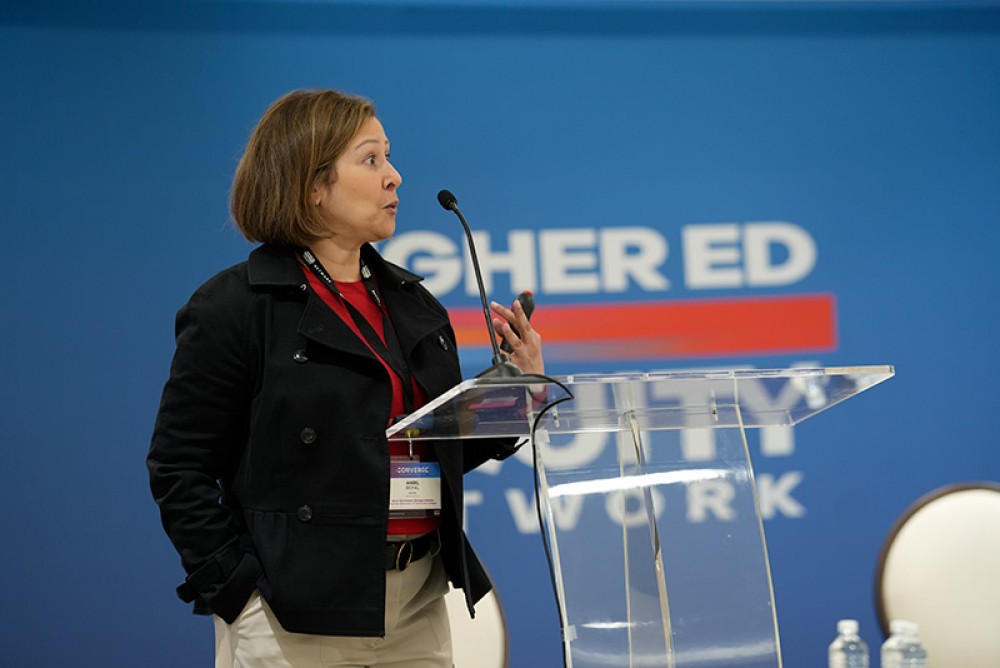
Employment data show that our higher education system is not equitably serving or supporting Black, Latino/a/x, and Indigenous students. For example, in the United States, persistent systemic barriers lead to inequities so deep that Black associate degree graduates earn less than white high school graduates over their lifetime, despite their educational success. Institutions of higher education must design their approaches to address racial disparities.
We have a responsibility to center Black, Latino/a/x, and Indigenous students in the design of our systems and how we connect with employers and communities so that they succeed not only through college but in the workplace and beyond. Higher education’s responsibility transcends graduation to social mobility and accumulation of intergenerational wealth. Solutions must go beyond disaggregating outcomes by race.
In our work with federal, state, and institutional leaders, we foreground the insights, perspectives, and lived experiences of Black, Latino/a/x, and Indigenous leaders and community members who reflect the students we seek to center. We also emphasize that it is vital that white allies share in the labor of this work because their efforts are essential to accelerating the pace of change.
Working as a collective impact network, we understand that addressing systemic racism in higher education will take a long time. We are committed to creating long-term change and are focused on sustaining our commitment beyond the current awakening of our collective awareness of racial inequity. We encourage those who are aligned with our mission to join us in this work.
The core of the Higher Ed Equity Network’s mission is collective action — identifying issues where together we can do more than any organization can achieve alone. Our Action Sequence defines the way we work to identify issues and mobilize to move the needle for racial equity in higher education. Ongoing network collaboration opportunities–as well as support from members and partners on communications, policy, practice, and data–drive the Action Sequence forward.
Priorities are identified through a member-led annual review process.
Newly formed Task Groups develop strategic plans for collective action.
Task Groups promote the agenda across the network, gathering inputs and preparing for collective action.
The Network launches and sustains the strategies and tactics outlined in the action agenda.
“The Network’s explicit focus on Black, Latino/a/x, and Indigenous students is so important. We’ve been tinkering around the edges for some time in higher education and knowing where the resources are most needed. Now is the time to allocate these resources where the need is the greatest so that increased college completion is no longer simply aspirational.”
- Yolanda Watson Spiva, President, Complete College America
#1 - Defending diversity, equity, and inclusion (DEI) efforts in the face of adversity.
The higher education sector faces a concerted, hostile effort to dismantle the structures and processes that support the success of Black, Latino/a/x, and Indigenous students. Anti-DEI legislation is having a chilling effect on initiatives that have been proven to drive student recruitment, retention, and completion—furthermore, it imperils the country’s democracy. This crisis requires fearless, persistent, and creative responses from higher education leaders.
Featured Work Product: Higher Ed DEI Navigator
#2. Upending the status quo on college affordability.
Black, Latino/a/x, and Indigenous students are disproportionately likely to take on massive debt that follows them for years, even decades after graduation. Across the higher education sector, admissions and financial aid practices need to be reformed so that the students who most need help can access it.
Featured Work Product: Compounding Inequities
#3. Collecting the right data to evaluate student success.
Data collection in higher education is complicated and often underfunded. Colleges and universities are required to collect vast amounts of data to meet accreditation requirements —but not always the right data to illuminate the best pathways to long-term economic and social mobility for students from minoritized communities. Higher education needs system-wide agreement on the type of data to collect and how to parse it so student success can be evaluated across all institutions, funders, and partners.
Featured Work Product: How Institutions Can Increase Social Mobility for Key Populations Through Strategic Data Use
#4. Unraveling transfer and credit recognition policies that delay completion.
More than a third of first-time college and university students transfer from one school to another—but the credits they earn at one institution often don’t follow them to the next. Students who start at a community college with the intention of transferring to a university lose an average of 22% of their credits. A system-wide overhaul of draconian transfer policies is long overdue, as it will immediately trigger faster, cheaper completion of college for millions of students.